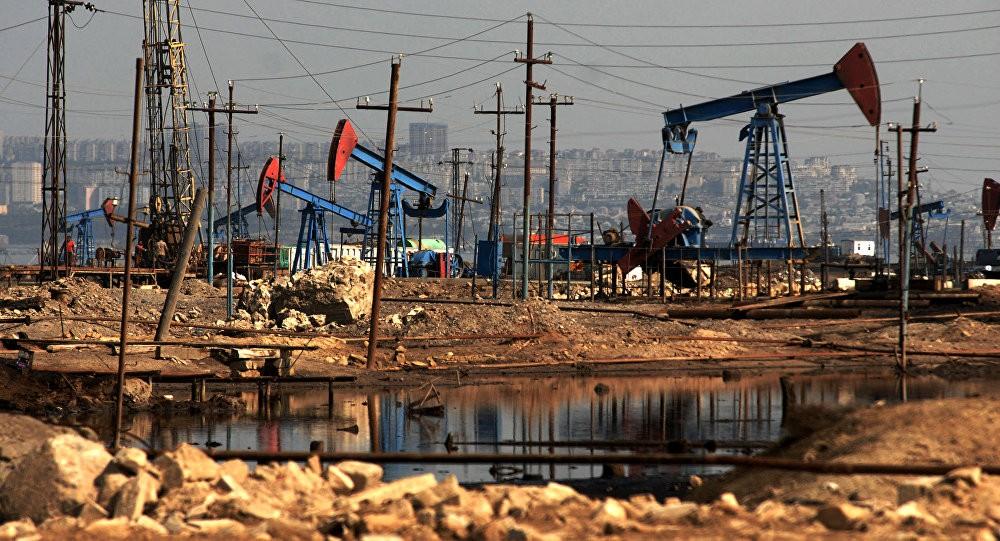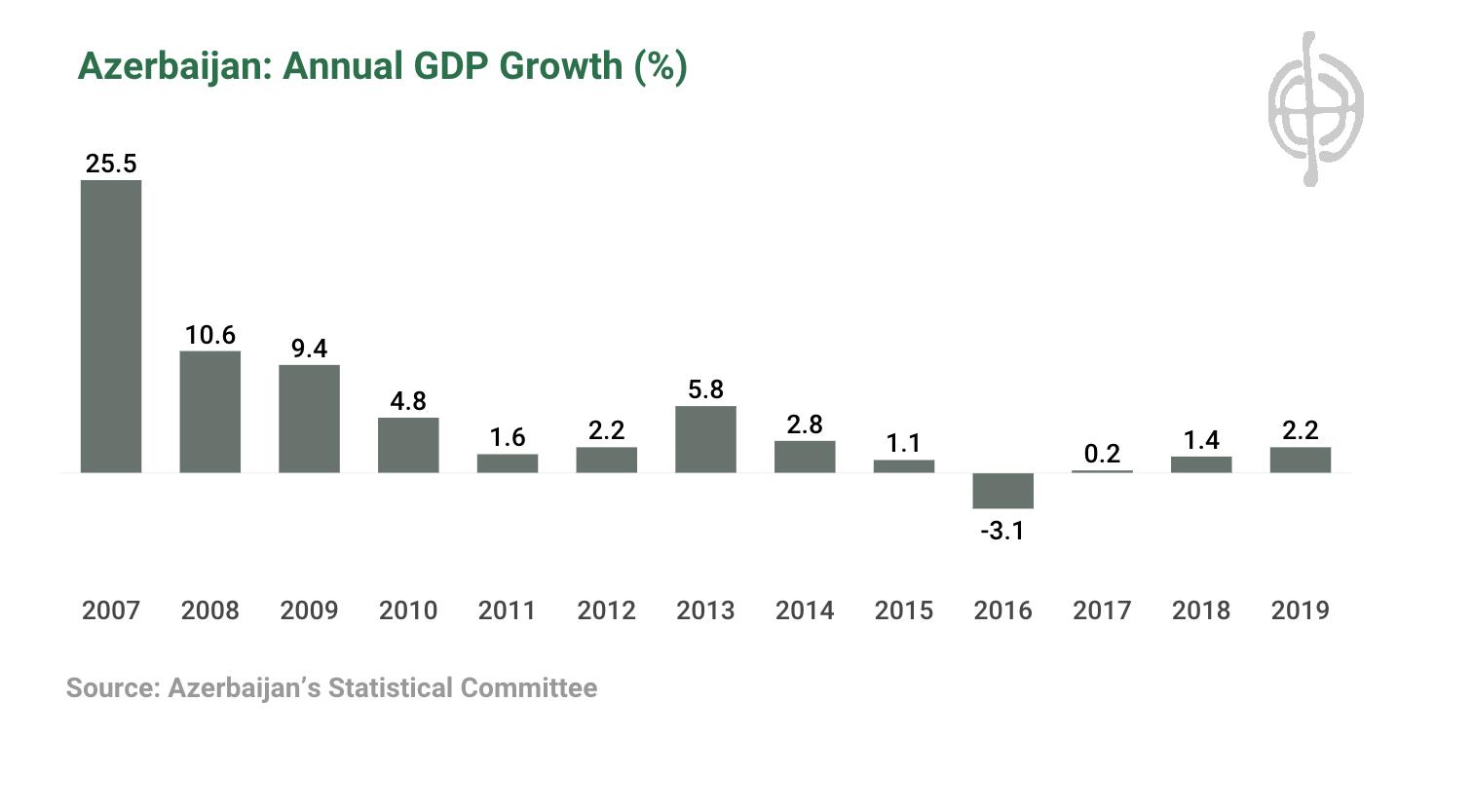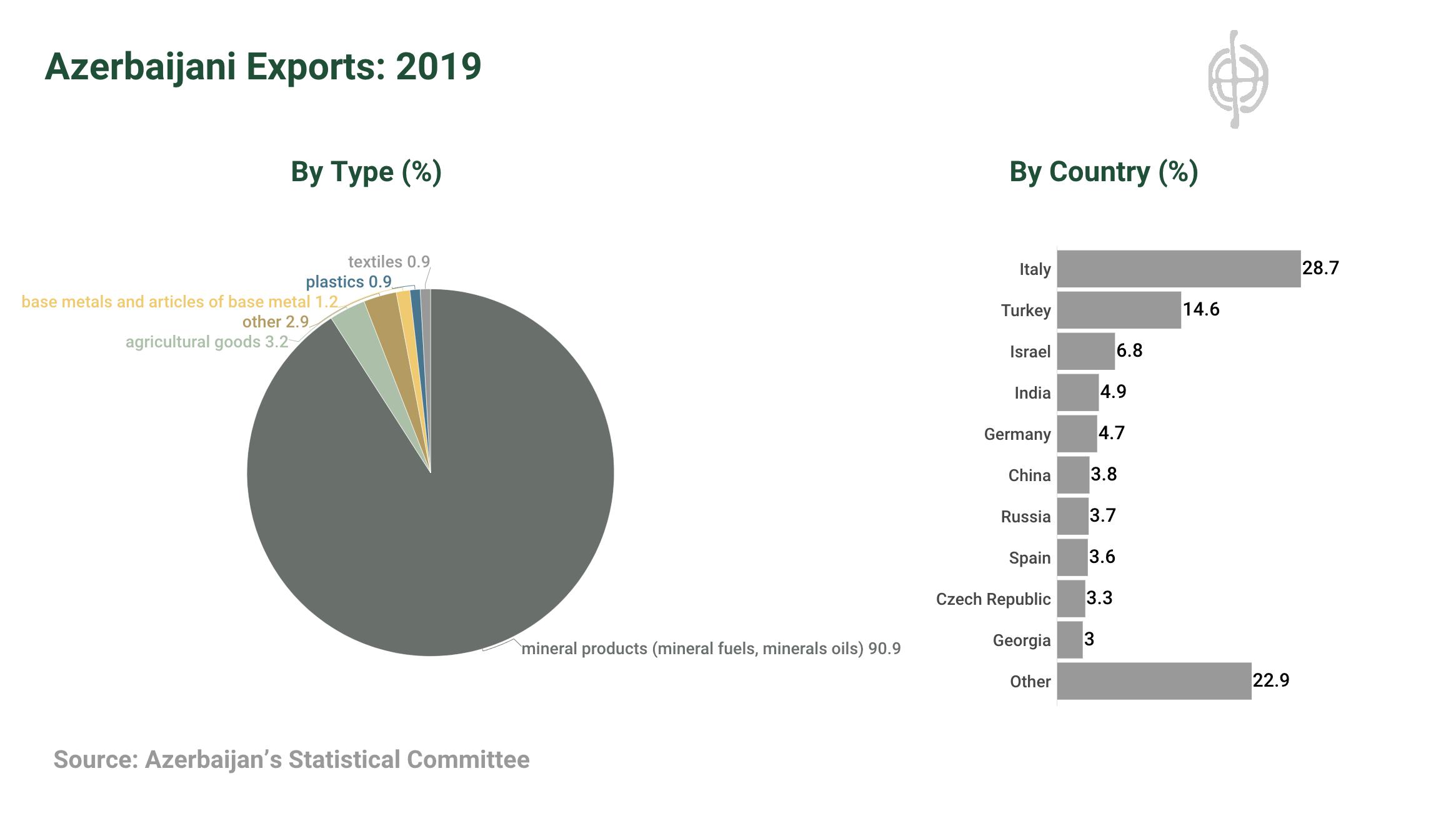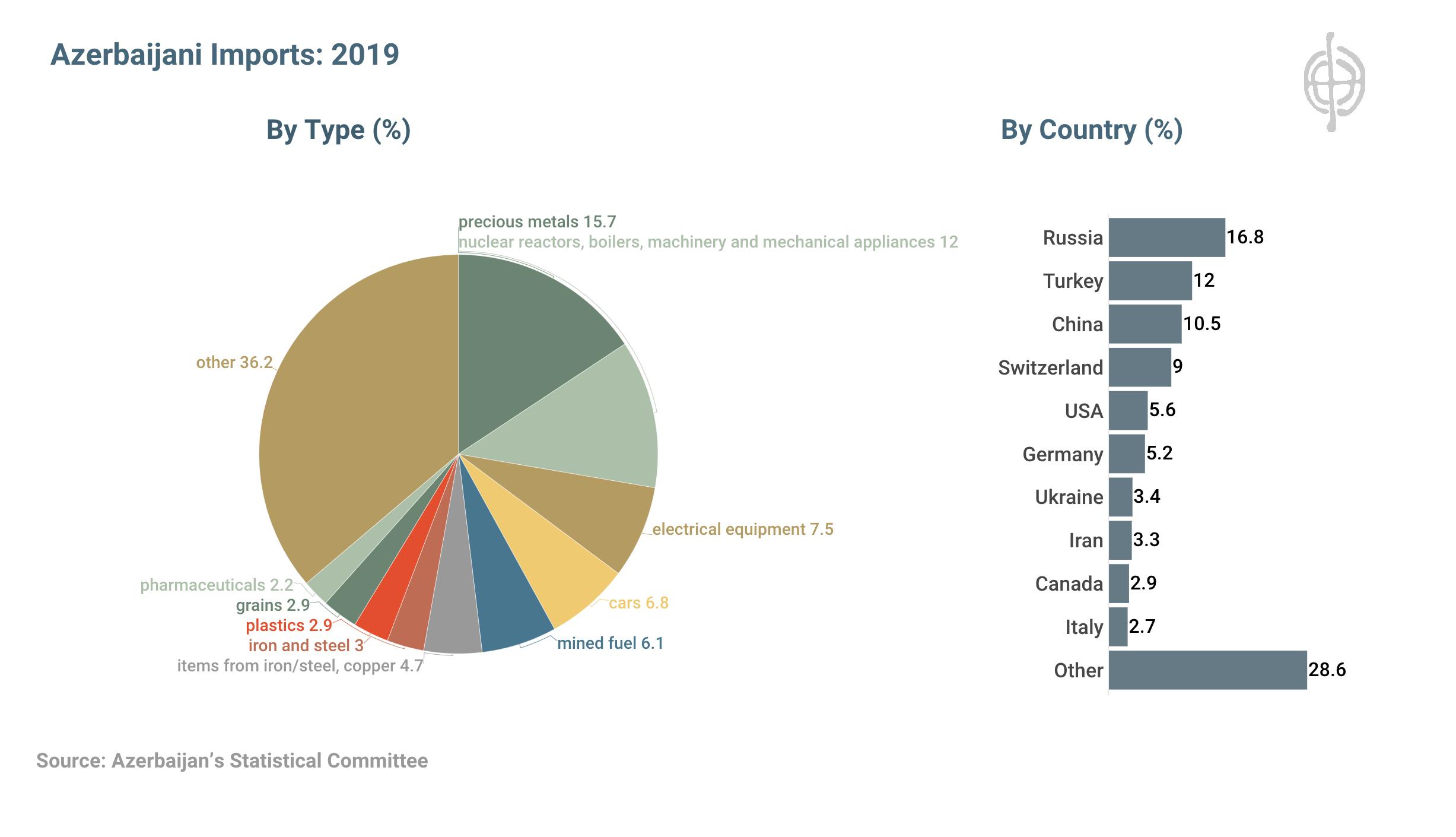
Oil, Azerbaijan and Baku’s Main Trading Partners
Azerbaijan's economy, which is based on the oil industry, is currently showing declining trends. On the one hand, the fall in world oil prices has a significant negative impact, on the other hand, the coronavirus epidemic. Add to all this the aftermath of the war on the Karabakh-Azerbaijani border.
Despite its rich oil and gas reserves, Azerbaijan's economy is not considered developed today. It is not diversified. It directly depends on the trends of the world oil market. Fluctuations in oil prices directly affect both the country's industry and the state budget, and the entire economy in a chain effect. The country's authorities are constantly "gambling" the country’s economy on oil and other natural resources.
According to various publications, including the Organization of Petroleum Exporting Countries (OPEC) and the US Department of Energy’s Energy Information Agency (EIA), proven oil reserves in Azerbaijan currently amount to 7 billion barrels. According to the EIA, Azerbaijan ranks 21st in the world by this indicator. By the way, the Azerbaijani media and official websites always publish contradictory information about oil and gas reserves, as well as extraction.
Azerbaijani opposition economists claim that their country's Statistics Committee falsifies macroeconomic data and does not show the current crisis. But even in the case of falsification, the statistics cannot hide the decline.
According to official statistics in Azerbaijan, in January-August this year, compared to the same period in 2019, the country's economic decline was 3%. At the same time, the volume of industrial production decreased by 3.1%, the volume of cargo transportation decreased by 18.3%, the volume of services decreased by 24%, etc.
Azerbaijan's economy has grown at a slow pace in recent years
According to the data of Azerbaijan’s Statistical Committee, 2019 economic growth of Azerbaijan measured 2.2%. Gross Domestic Product (GDP) was US$48 billion. According to the World Bank, Azerbaijan ranks 89th in a list of 203 countries by GDP.
Before 2008, Azerbaijan's economy grew at a high rate due to petrodollars flowing into the economy.
Economic growth has slowed sharply since the 2008-2009 global economic crisis. The last economic downturn, according to official data, was registered in 2016.
According to the International Monetary Fund, Azerbaijan will close 2020 with a 4% economic decline.
In an interview with EurAsia Daily, Azeri economists Natig Jafarli and Akram Hasanov said that Azerbaijan's economy is suffering greatly from the coronavirus.
"In fact, the epidemic showed how unreliable the statistics were in the country. There is a deterioration of economic indicators in all directions. The epidemic has affected all segments of the population. In general, the welfare of the population of the republic has decreased," said Jafarli.
He noted that the only "safety cushion" in Azerbaijan is the Oil Fund, which has accumulated about $ 40 billion.
In Azerbaijan, according to the latest official data, the poverty rate is only 5.1% (according to 2018 data) and the unemployment rate is 5.5% (according to 2019 data). Meanwhile, the Azerbaijani public and analysts have reservations about these numbers, since the country's Statistics Committee is known for trying to get the desired numbers as a result of various tricks. There is a big "gap" between the various strata of the Azerbaijani society, rich and poor.
Azerbaijan's dependence on oil
Manufacturing (40-45%) enjoys the largest share in Azerbaijan's GDP, which in turn is largely (about 80%) composed of oil, gas and other mineral resources. For comparison, only 5% of Azerbaijan's GDP is derived from agriculture, construction - 5%, services - 15%, etc.
Since Azerbaijan's economy is "fed" mostly by oil, statisticians divide it into two major sections to describe the size of the economy: oil and gas, and non-oil.
Thus, according to the latest yearbook published on the website of the Statistical Committee of Azerbaijan, in 2018, about 40% of the country's GDP was generated from the oil and gas sector. This indicator has reached 60% in different years.
In addition, most of the state budget revenues of Azerbaijan (70-80%) are generated again from the oil and gas sector. The oil industry is controlled by The State Oil Company of the Republic of Azerbaijan (SOCAR). It also oversees plans by international companies to discover new oil and natural gas in Azerbaijan.
Thus, Azerbaijan's economy is highly focused on the oil and gas sector, which is the reason for its dependence on the world oil market. And the economy of the non-oil sector is weak, for example, the processing industry.
At the same time, oil is the "trump card" of the Azerbaijani economy, the main obstacle to its development. Dependence on oil regularly rocks the economy of Azerbaijan, as happened in April this year, when oil prices fell sharply in the world market. At that time, Azerbaijani President Ilham Aliyev announced that Azerbaijan was losing up to $1 billion due to the drop in oil prices.
This and other shocks directly affect the Azerbaijani currency, the manat. However, the Azerbaijani government keeps it artificially stable by regularly flooding the market with the currency in the Central Bank's reserves, which prevents its devaluation. As a result, in March of this year, when the national currencies were depreciating in the region, the manat did not register significant fluctuations.
Italy, Turkey and Israel are Azerbaijan's main export partners
According to Azerbaijan’s Statistical Committee, goods worth $19.6 billion were exported from Azerbaijan in 2019, an increase of 0.7% over the previous year.
In the first eight months of this year, exports amounted to $7.9 billion, down 31.5% from the same period last year. At the same time, as reported by Azerbaijani media, citing the Ministry of Energy, the physical volume of oil exports fell by 8%.
About 91% of goods exported from Azerbaijan in 2019 was mined fuel, mainly oil. The other 9%, were agricultural products, textiles, plastics, etc.
In other words, if the oil and gas sector is excluded from Azerbaijan's exports, they will only amount to some $1.8 billion.
The five major export markets of Azerbaijan are Italy, Turkey, Israel, India and Germany. Italy leads the pack, purchasing almost one third of the oil exported from Azerbaijan. In general, according to the United Nations International Trade Database (UN Comtrade Database), these major partners buy most of their oil from Azerbaijan.
In 2019, these five countries accounted for about 60% of Azerbaijan’s exports. We can thus conclude that according to the countries, Azerbaijan's exports are not diversified.
China, Russia, Spain, the Czech Republic and Georgia are also in the top ten of Azerbaijani export markets.
Azerbaijan imports mostly from Russia, Turkey and China
In recent years, Azerbaijan's foreign trade balance has been positive: it has exported more than it has imported. In 2019, as we mentioned, exports amounted to $19.6 billion, while imports amounted to $13.6 billion. Compared to 2018, imports increased by 19.1%.
In the first eight months of this year, goods worth $5.9 billion were imported (a decrease of 30%).
Most of the goods imported to Azerbaijan are from Russia, Turkey, China, as well as Switzerland and the United States. According to 2019 data, these five countries accounted for about 54% of Azerbaijan's imports. Germany, Ukraine, Iran, Canada and Italy are also in the top ten.
Leading the list of imported goods are precious stones and metals, nuclear reactors (boilers, equipment և mechanical devices, their parts), electric cars and equipment, mineral fuel. By the way, the information about the products starting with code 93 is not published in the trade database. It is the code of weapons and ammunition.
According to the World Bank, in 2019, foreign direct investment (net inflows) in Azerbaijan amounted to $1.5 billion. In recent years, investments in Azerbaijan have significantly decreased, especially after 2016. For comparison, in 2016, foreign direct investment in Azerbaijan amounted to $4.5 billion.
Turkey, Russia, the Netherlands, the United Kingdom, the United States, the United Arab Emirates and Switzerland mainly invest in Azerbaijan.
Azerbaijan is regularly subjected to economic shocks, the reason for which, as we mentioned, is the structure of the economy. However, on the one hand, the country's authorities are hiding the real picture of the economy with statistical trickery, on the other hand, they are assuring the public that their natural resources, particularly oil, will be enough for at least a few decades.
 Videos
Videos Photos
Photos



Write a comment